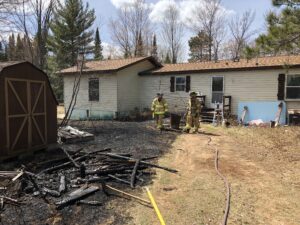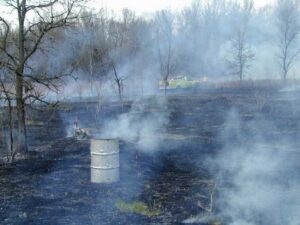State regulations allow individual households to burn small amounts of dry, household rubbish which includes only unrecyclable paper and cardboard, natural fibers, clean, untreated wood and similar materials, and small quantities of dry leaves and plant clippings unless prohibited by local ordinance.
However, fire officials caution that the open burning of many materials produce a variety of air pollutants that is unhealthy for your or your neighbors to inhale. In addition, debris burning is the number one cause of wildfires in Wisconsin, accounting for nearly 30% of the state’s wildfires each year.
If burning is the only option for yard waste, burning permits may be required to burn yard debris piles or for broadcast burning any time the ground is not entirely snow-covered. Permits ensure legal and responsible burning with minimal wildfire risk.
In DNR Protection Areas, permit holders are authorized to burn small amounts of vegetative materials, such as leaves, brush and pine needles.
To learn more about Wisconsin burn permits and alternative methods to open burning, visit the DNR’s Open Burning webpage.
If you choose to burn, follow these simple guidelines to burn safely:
Before Burning
- Find alternatives to burning debris before deciding to burn
- Obtain proper burn permits and follow all restrictions
- Comply with local ordinances
- Burn legal materials only
- Watch the weather and avoid burning in windy conditions
- Ensure the area adjacent to the fire is free of all flammables
During Burning
- Have a water source and firefighting tools nearby
- Keep the size of the fire small and manageable
- Maintain a mineral soil firebreak around the burn area
- Never leave the fire unattended
- If weather conditions worsen, put the fire out
- If the fire escapes, dial 911 immediately
After Burning
- Make sure the burn is completely out before leaving
- Use lots of water, drown, stir and repeat until cold
- Recheck the fire for remaining smoke or embers
Burn Clean To Protect Community Health
Not only can burning affect the environment, but it can also compromise one’s health or a neighbors’ health. Burning plastics and treated or painted wood can release carcinogens such as arsenic, benzene and formaldehyde into the air. Children, older adults and people with cardiac disease and respiratory ailments, such as asthma, are generally more sensitive to smoke from burning garbage.
Recycling and composting can replace the open burning of trash and yard debris. Most communities in Wisconsin have a recycling program for plastic, glass, metal containers and paper. For yard debris, composting is a great alternative option to burning.
It is also illegal to burn recyclable materials such as glass, plastic, metal containers and clean paper as well as agricultural and horticultural plastics such as silage film, haylage bags, bale wrap, woven tarps and nursery pots and trays.
Check out the DNR’s “Can I Burn” web tool to help determine if burning is allowed under Wisconsin state air and waste management regulations. State regulations are the minimum open burning requirements and local ordinances may also apply. It’s best to check with local officials to determine the best disposal options in your area.

Burn barrel fire by house. Photo Credit: Wisconsin DNR

Burn barrel fire that got out of control. Photo Credit: Wisconsin DNR
